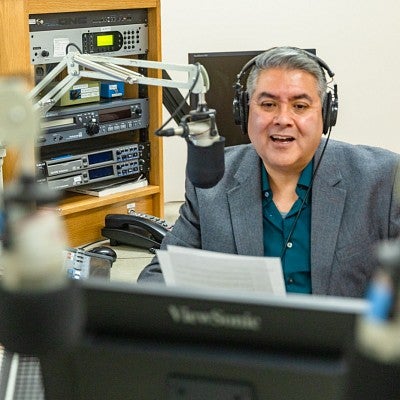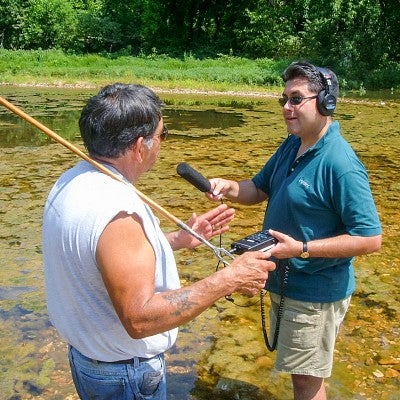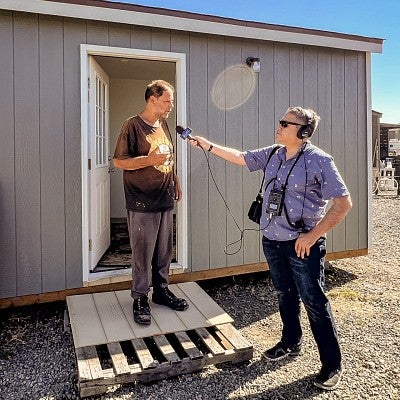Assistant Professor of Journalism Brian Bull shares his advice for reporting compelling news stories.
By Julia Boboc, class of '26

When it comes to getting people to share their stories, reverence and respect outweigh hard-hitting and intimidating approaches to newsgathering. That’s what Assistant Professor of Journalism Brian Bull took away from his 28 years behind the mic as a radio news reporter.
Bull joined the SOJC in December 2023 after an award-winning career as a reporter and producer. He comes to the UO School of Journalism and Communication (SOJC) from KLCC, a Eugene public radio station, where he continues to contribute pieces and expertise.
Bull’s decades of reporting across the United States have left him with an extensive resume and a lifetime of lessons. As a professor, Bull now imparts his reporting insights on a new generation of journalists.
He shared some of his insights, journalism reporting tips and strategies for uncovering compelling stories with us.
SOJC: How do you find your story ideas?
Brian Bull: Well, I peruse a lot of newspapers. I peruse the wires. I look through emails and I think to myself, “What are the things that an audience would be really fascinated by or really want to know about?” Then I pitch it to our news director.
How do you prepare for an interview?
Whether you have five minutes or a couple of days before you meet the source, do what you can to research them. Look at their LinkedIn profile, see if they have a Facebook account. Google their name to see where they’ve come up in other articles. A lot of times, I’ll just come in with a general expectation of what to talk about and then I’ll keep the conversation going.
I also work with a recorder and it’s, in some ways, a barrier I have to overcome when I show up, slip on the headphones, pull out the recorder, microphone and cable, and I’m setting levels. So I do what I can to put them at ease, because the microphone may as well be a loaded gun to some people.
Brian Bull’s Top Tips for Pitching a Story:
- Be concise. You should be able to articulate what the story is and why people should care in two, maybe three, sentences. This is what some people call the elevator pitch.
- Don’t denigrate your own pitch. Sometimes, especially with younger, up-and-coming reporters, they approach me and say, “You’re probably gonna think this is a stupid idea,” or “This is not really an interesting story, but…” Don’t do that. I’ll be the judge of whether it’s not a good idea or it’s not interesting.
- Tell the story in a way that has not been done already. Sometimes that could be an interesting new perspective or an angle that’s not been approached yet. But if it’s going to be a story that sounds like the same story that The Register-Guard, the Eugene Weekly, KVAL or the Daily Emerald have already done to death, well, find an angle that’s new or different.
How do you put them at ease?
I make small talk and I often complain about the cables because I’m always untangling myself. It shows me as a human being.
What are your favorite stories to tell and why?
I like stories where everyday people come and talk to me about their struggles or their hopes.
I’ve talked to victims of domestic violence who talked to me about trying to find new lives away from their abusers. I talked to an Army veteran who liberated a concentration camp in Germany in the final days of World War II. At the site of the Holiday Farm Fire, I was out there talking about rebuilding efforts.
Those are my favorite stories. Stories about perseverance, resilience, rebounding and not letting devastating setbacks define them.
How do you tell a story about something as devastating or as sensitive as those examples without being exploitative?
Some of that does begin with how you approach the sources. I don’t hop out of the car with a microphone or camera at the ready. I invite them to tell their story. If you can create that empathy and approach them with that reverence and respect, that, “Hey, you’ve been through something, and I would like you to please share with me what that was for my audience,” it’s opening the door for them. And I’ve also found that people welcome the opportunity to speak. By keeping them in the consciousness of the public, they feel like they’re not forgotten. They feel like their story is still important to people to relate to.
And then of course, if someone I talk to, at the end of the interview, says, “I can’t do this anymore. Can you please put that away?” I’m happy to. They need to remember that they have full control over the interviews themselves. I think respect is key.

What stories challenged you the most, either emotionally or technically? How did you get through them?
I was doing a story a few years back about the Native American communities’ and agencies’ reaction to COVID-19. But I remember there was one organization that was not excited about giving me any information about their outreach or their funding or about administering the vaccines. After throwing my arms up and telling my editor, “I’m sorry, it’s gonna be another week or two because I’m just getting nowhere,” I actually managed to do a deep dive into the data. There was a federal database; it was this mind-numbingly bizarre and complicated database, but I managed to go through the back door, so to speak, and find the stats I was looking for. Sometimes you just have to find new avenues, worm your way around and get the information from other sources. We often think that maybe the front door is the only way to go, but there are side doors and windows you can crawl through, too.
Do you have a set of guidelines or tips for overcoming the typical challenges of storytelling and journalism?
The first (challenge) that I overcame was writing. When you write an audio feature, the first thing you have to do is write the lede. I got very obsessed with getting everything right on the first draft and had to be perfect. There was a reporter and producer (at NPR) by the name of Alex Chadwick. He said, “Brian, just write. Just get it out on paper, get it out of your mind.” And then he said, “You can go back and you can reshape it, revisit it, figure out what’s extraneous, what’s unnecessary, and then clean it up.” That was really liberating for me because I was in this mindset where everything had to be spotless. I was at an NPR training and I wanted to impress everyone, but really, it was just a matter of getting the gray matter out and onto the paper.

What is your advice for up-and-coming journalists?
I think one of the best things I would say is always take your audience somewhere they’ve never been. Always share a voice with your audience that they’ve never heard. If you can find a perspective that someone never thought of before, or an element that no one assumed before, you’ll keep it from being forgotten. You’ll make unforgettable reporting.
We report on a lot of dire and negative things out there: political strife and turmoil and poverty and the polarization of our culture and environmental doom. But we owe it to ourselves and our audiences to offer little glimmers of hope. Find people who are helping. Whether it’s train derailments or climate change, there are people who are helping, who are trying to affect positive outcomes. It’s called solutions journalism.
Do you have anything else you’d like to add?
I have a lot of high hopes for the reporters of tomorrow, the next generation. If I have any other last bits of information or advice to share, it would be to stretch your abilities. I see journalists today who say, “Oh, I’m going to go into radio or I’m going to be a TV reporter or I’m going to be print.” And I think it really makes you more marketable and competitive to dabble in all the mediums and formats available. And it seems like here at the SOJC you have a lot of opportunities to explore other mediums and formats.
And save your story! Don’t rely on the internet to keep your work up there indefinitely. I had this great interview with science fiction author Ray Bradbury, and at one point, Wisconsin Public Radio just scrapped that, removed it from its website, and I could not find it anywhere. It’s like, oh my God, what did you do with my baby? So save your own files of work you want to keep because there’s no guarantee it’s going to be there 10 or 20 years down the road.
This interview has been edited for length and clarity.
Julia Boboc is a third-year journalism major in the UO School of Journalism and Communication direct-admit program and a member of Clark Honors College. She especially enjoys interviewing and writing profiles and feels everyone has a story to tell. She loves trying new things in journalism and taking on cool projects.
